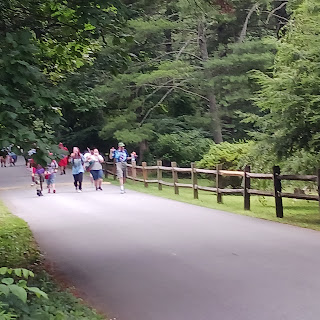Yesterday as we drove across the mountain to Faith Lutheran in Bristol, Tennessee where I preach every Sunday, I saw a very small maple tree with most of its leaves that glorious scarlet color that says autumn to me, not July 30.
I thought that maybe the tree had something wrong with it, but as I looked at all the trees, I noticed that many of them have shifted a bit. I saw lots of browns and bronzes, rusty shades, the kind of color that I first read as too much spraying of herbicide. But I saw the color on tree after tree, county after county, across state lines, so I think I'm seeing the first signs of autumn, signs so subtle that I would have missed them, had I not seen the scarlet maple tree.
I feel the pang that I remember from summers from a distant past, that pre-emptive mourning. I know that my pace of life increases in just a few weeks, and I'm enjoying this more relaxed pace that I have now. I know that come October, I'll be missing these summer days that have less structure. And this year, I'm lucky to have summer days that have warmth, but not the blazing heat that make me yearn for summer to just be over and done with.
This week is the last week of camp at Lutheridge, and it's the week I'm volunteering as a Bible study (C3ARE) leader for middle schoolers. I thought I'd be doing it by myself, but much to my surprise, we're in teams this week--and my teammate is a Create in Me friend. Hurrah!
We are both teachers and have been for decades. We have the kind of background where we could create an entire curriculum with not much prep time, so I don't feel much stress about it. Plus, she's been a C3ARE leader with middle schoolers for years now, so she knows what to expect. The campers will be off site for 2 of our 3 mornings, and camp ends on Friday this week, not Saturday, so it's a reduced load of a week.
Next week is my last week of summer, and it's not even a complete time off--my online classes end on Monday, which means I'll have grading to do. I am taking advantage of this time of less responsibility and getting in a trip to see my parents in Williamsburg. When I thought about moving to seminary, I knew that I wanted to see my parents more often, and even though I've moved further away, I still want to do that. Even though I'm in a bit of denial about my own age, I'm not in denial about their age; I know that we don't have decades of time together.
But this morning, a different kind of time transport awaits--breakfast in the dining hall! Let me get ready.




















